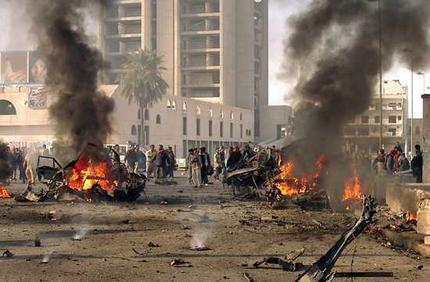
The Los Angeles Times called Tuesday’s attack the “bloodiest single attack in months.”
The Associated Press reported the death toll at 60, with another 125 wounded. Reuters cited the Deputy Minister of Health as saying the death toll was 47 and not expected to increase.
The New York Times had some of the best coverage, including details from eyewitnesses at the scene, who explained the final day of recruiting had drawn a large crowd of young men looking for steady work in the Army, and the bomber had taken everyone off-guard. According to the witness who spoke to the Times, the bomber set off the explosion just after military police asked him for identity papers.
A day earlier, Iraq’s two main political blocs called off talks for the formation of a coalition ministry.
The Sunni-and-secular-backed Iraqiya coalition of former Iraqi premier Iyad Allawi, said Monday it had suspended talks with the State of Law bloc headed by Nouri al-Maliki, the incumbent prime minister, in protest against his “sectarian tone,” but that it would resume the talks if al-Maliki apologized for his remark.
In an interview with al Jazeera, Wafiq al-Samarai, a former Iraqi intelligence chief and security adviser to Jalal Talabani, Iraq’s president, explained it is the lawmakers themselves who are ultimately responsible for failing security.
“Politicians are responsible for what is happening, because they excluded Iraq’s veteran and experienced intelligence officers for sectarian and revengeful motives. Moreover, they are oppressing the current ones by passing their reports to militias of ruling parties.
It’s impossible to ignore the fact that the increase in violence in recent months is attributable to the political vacuum that’s existed in Iraq since the March parliamentary elections. Now, as US combat troops begin their pull-out in earnest at the end of August, urgency surrounding the impasse grows with each passing day. Although the Wall Street Journal reports the White house is still confident the combat mission will end on schedule, there are hints that US now supports a move that would diminish the powers of the Prime Minister, but bestow much greater authority on a proposed “council on national strategy.”